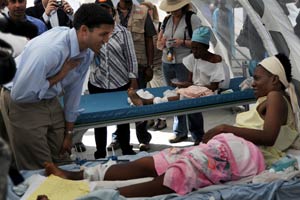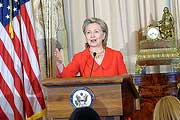US global health plans are further defined
June 2010 | Volume 9, Issue 3
The U.S. government continues to define how it will implement its
Global Health Initiative (GHI), announcing new countries to be included, specific goals for USAID and CDC, and a fund that will support health projects targeting women and girls.

Photo by Tech. Sgt. Dennis J. Henry Jr./US Air Force
Dr. Rajiv Shah, the USAID administrator, has laid out a
broad plan for reforming his organization.Above, he
visits a hospital in Port-au-Prince, Haiti to check on
post-earthquake relief operations.
Eight countries have been selected as the first set of "GHI Plus" countries, including Bangladesh, Ethiopia, Guatemala, Kenya, Malawi, Mali, Nepal and Rwanda. These countries will receive additional resources to quickly implement GHI's approach, including integrated programs and investments across the spectrum of infectious diseases, maternal and child health, family planning, and health systems activities.
GHI is a six-year, $63 billion initiative to help partner countries improve measurable health outcomes by strengthening health systems and building upon proven results.
Through GHI, the U.S. government is pursuing a comprehensive "whole-of-government" approach to global health, led by a committee comprised of the heads of USAID and CDC, and the U.S. Global AIDS Coordinator.
USAID details four core areas
USAID Administrator Rajiv Shah recently laid out a broad plan for reforming his organization during a town hall meeting in Washington. "This is a time to be bolder, to reach beyond our comfort zone, and to be imaginative about how we can work better, cheaper, and faster in the pursuit of high impact development," he said.
Shah detailed four core areas for USAID: recommitting to the Millennium Development Goals, investing in successful country-owned models of growth and development, finding new ways to leverage science and technology, and bringing USAID's expertise to bear on sites of active conflict.
In particular, he called on researchers to redouble efforts to produce vaccines to protect against AIDS, malaria, pneumonia and rotavirus. "We will dramatically accelerate our efforts to solve the major science, technology, and engineering challenges in development and engage the full federal science community in this effort," he pledged.

Photo courtesy State Department
Secretary of State Hillary Rodham
Clinton has launched an
international fund for women and
girls, a public-private partnership
that will support health projects
and other initiatives.
Fund launched for women, girls
Secretary of State Hillary Rodham Clinton has launched an
international fund for women and girls, a public-private partnership that will provide grants to NGOs to develop effective and innovative solutions to benefit women and girls. It will focus on global health, economic empowerment, violence against women and improved access to education.
"We know that everywhere in the world, on the ground, are groups of people who are taking these issues on," Clinton said. "We want to be your partners and we want to help you learn what worked somewhere else."
The Fund will invest in maternal, newborn and child health projects, as well as efforts to prevent and treat fistula.
CDC outlines global health themes
CDC Director Dr. Thomas R. Frieden outlined his organization's global health agenda during a recent speech to a Washington think tank. The CDC will strengthen the use of data to manage global health programs, he says, while bolstering developing country public health systems.
"By doing those things we will generate data you can trust, data that means something, not simply the best guesses that we have but actually data that is used in programs, and that can be relied on to make decisions, and a public health sector that can get things done," Frieden said.
Strengthening public health capacity in developing countries will be critical to success, he concluded.
More Information
Visit the following Web resources for additional information about the U.S. Global Health Initiative.
To view Adobe PDF files,
download current, free accessible plug-ins from Adobe's website.